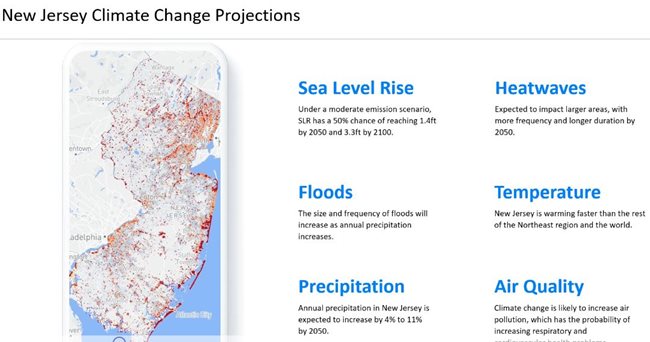NJTPA and other Metropolitan Planning Organizations (MPOs) can take a leadership role in moving climate change resiliency planning beyond basic research about vulnerabilities to more detailed action plans tailored to local conditions. That was a key insight Anne Choate, Vice President of Energy, Environment, and Infrastructure at ICF, offered in a presentation at the NJTPA Board of Trustees’ July meeting.
Choate said studies of transportation resiliency needs around the country funded by the Federal Highway Administration (FHWA) over the last decade have yielded increasing knowledge to guide more “granular” and “place-based” investigations in each region. Her firm, ICF, has consulted on these efforts at all levels of government.
She said New Jersey has faced particular challenges. A 2020 study by the New Jersey Department of Environmental Protection found that by mid-century sea levels could rise by 1.4 feet and precipitation could increase 4 to 11 percent in the state. That will exacerbate already severe flooding in many areas. It will be accompanied by more frequent heat waves of longer duration, with increasing health impacts for seniors and other vulnerable populations.

She emphasized that the success of transportation resiliency efforts depends on recognizing the “interconnected and interdependent” nature of systems affected by climate change, including energy, water, health, natural resources and more. This, she said, avoids creating “adaptation islands.”
She said NJTPA was an early leader in climate change resiliency planning through its participation in FHWA-sponsored studies, including exploring the impacts of Hurricane Irene and Superstorm Sandy and later identifying vulnerabilities in the Passaic River basin area. Lessons learned from these and other efforts, she said, will be reflected in guidebooks FHWA will be issuing on integrating resiliency into the planning process and in asset management.
MPOs, she said, are particularly important to resiliency efforts because climate impacts cross jurisdictional boundaries and touch many interests. She said they have a “unique ability” to convene diverse stakeholders, coordinate on a regional basis and balance competing concerns such as equity, mobility, access and health. If done right, she said, resiliency planning provides “opportunities for synergy where you can achieve multiple goals.”
To gain support of the public and key officials, she said, MPOs can help build the “business case” for resiliency planning. She gave the example of a detailed economic analysis done of proposed stormwater upgrades in Miami. While the improvements are costly, conducting the analysis enabled planners to have conversations with developers and others about their potential benefits “with real hard data in their back pockets.”
NJTPA First Vice Chair John Bartlett, a Passaic County Commissioner, expressed agreement with the approach, noting that for resiliency “inaction can cost more than action.” He thanked Choate for her presentation.
A recording of the presentation is available on the NJTPA
YouTube Channel